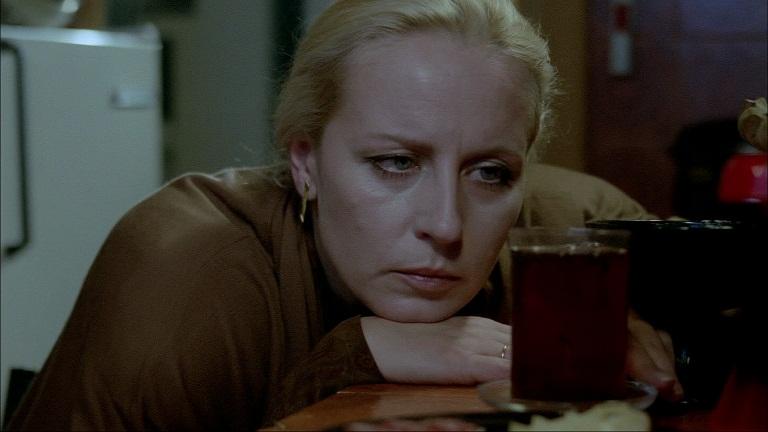“Existential realism” is a term, contradictory though it might sound, that comes to mind when describing the work of the great Polish director Krzysztof Kieślowski. The films he made in the last five years of his life – The Double Life of Veronique (1991) and the Three Colours trilogy – may be his best-known, but the director had already been exploring the same fundamental concerns for a quarter of a century by then. Working in both documentary and short-film forms, some of those earlier works are as distinctive as anything that Kieślowski went on to create after the changes of the late 1980s opened up (in philosophical as well as production terms) a new world to him.
The remarkable Dekalog, completed in 1988, was the final work from Kieślowski's earlier period, and this dual-format re-release from Arrow Academy, in a 4K restoration, brings a masterpiece of late 20th century cinema back to our attention. Its ten hour-long episodes were made for Polish television: it’s remarkable to think that originally Kieślowski hadn’t even planned to direct all ten films himself. “Someone should make a film about the Ten Commandments,” his co-scriptwriter Krzysztof Piesiewicz (who was also, revealingly, a trial lawyer) had suggested after they had run into official trouble on their previous film. Dekalog consolidated that professional partnership, as well as the collaboration with composer Zbigniew Preisner, whose contribution is no less distinctive: both would continue working with Kieślowski until his death in 1996, at the tragically early age of 54.
 The relation of each of the ten films to the biblical commandments is loose rather than programmatic, but they share the preoccupation of trying to live with some degree of personal morality in a system largely antipathetic to such concerns. Kieślowski places his characters – who are inter-connected by virtue of their living on the same massive housing-estate, an entity which sometimes almost seems to feature as a character itself (release box, pictured below left) – in a series of dilemmas which demand anything right up to a fundamental re-examination of principles, and most frequently veer towards tragic conclusions.
The relation of each of the ten films to the biblical commandments is loose rather than programmatic, but they share the preoccupation of trying to live with some degree of personal morality in a system largely antipathetic to such concerns. Kieślowski places his characters – who are inter-connected by virtue of their living on the same massive housing-estate, an entity which sometimes almost seems to feature as a character itself (release box, pictured below left) – in a series of dilemmas which demand anything right up to a fundamental re-examination of principles, and most frequently veer towards tragic conclusions.
That’s never more clearly the case than in the fifth of the films, which Kieślowski expanded (by about 25 minutes of screen time) into the lacerating A Short Film About Killing for separate theatrical release: it became the work that really brought him international renown. (Episode six became A Short Film About Love, while the director had also planned to adapt the ninth part into a work themed around jealousy). If that unforgettable work – its bleakness is even more pronounced in its longer version – conveys brilliantly one extreme of Kieślowski’s world, the opportunity to watch the ten films in their entirety brings home that Dekalog's perspectives were broader, encompassing also the more general, lower-key struggles of existence (though interestingly Dekalog is not much concerned with either the political issues or the problems of subsistence of the era). Religion features, if not in the foreground: the director once spoke of his “personal and private” relationship with God, and these films engage on that level as much as any other, in a world in which humanism, or its absence, means far more than any formal dogma.
 By contrast, the five earlier television works in this collection reveal much more about Kieślowski’s engagement with the more quotidian realities of the period in which he lived, including his first full-length feature Personnel (1975) about life in a Warsaw theatre company that drew directly on his college experience, and Short Working Day (1981), a story anchored in events of a 1976 workers’ protest: the director began his career as a documentarian, and the preoccupations of that form never left him. This exemplary package is complemented by Maria Zmarz-Koczanowicz’s Krzysztof Kieślowski: Still Alive (2007), an 82-minute portrait of the director by one of his former students, as well as an accompanying booklet collecting essays on Dekalog and Kieślowski, and extracts from the director’s own discussion of his films.
By contrast, the five earlier television works in this collection reveal much more about Kieślowski’s engagement with the more quotidian realities of the period in which he lived, including his first full-length feature Personnel (1975) about life in a Warsaw theatre company that drew directly on his college experience, and Short Working Day (1981), a story anchored in events of a 1976 workers’ protest: the director began his career as a documentarian, and the preoccupations of that form never left him. This exemplary package is complemented by Maria Zmarz-Koczanowicz’s Krzysztof Kieślowski: Still Alive (2007), an 82-minute portrait of the director by one of his former students, as well as an accompanying booklet collecting essays on Dekalog and Kieślowski, and extracts from the director’s own discussion of his films.
Overleaf: Watch the trailer for the Arrow Academy re-release of Dekalog















Add comment